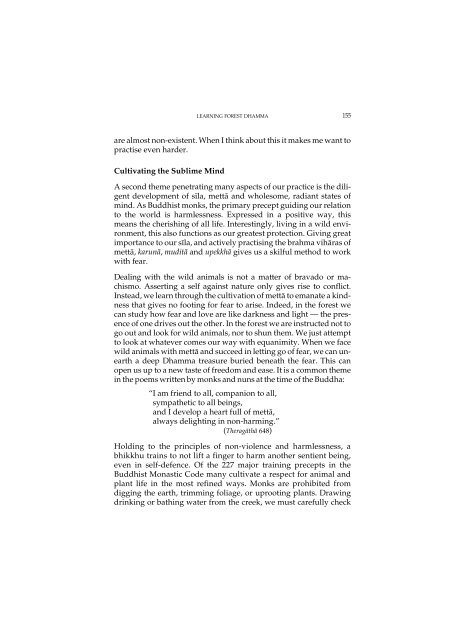Forest Path - Amaravati Buddhist Monastery
Forest Path - Amaravati Buddhist Monastery
Forest Path - Amaravati Buddhist Monastery
Create successful ePaper yourself
Turn your PDF publications into a flip-book with our unique Google optimized e-Paper software.
learning forest dhamma 155<br />
are almost non-existent. When I think about this it makes me want to<br />
practise even harder.<br />
Cultivating the Sublime Mind<br />
A second theme penetrating many aspects of our practice is the diligent<br />
development of sãla, mettà and wholesome, radiant states of<br />
mind. As <strong>Buddhist</strong> monks, the primary precept guiding our relation<br />
to the world is harmlessness. Expressed in a positive way, this<br />
means the cherishing of all life. Interestingly, living in a wild environment,<br />
this also functions as our greatest protection. Giving great<br />
importance to our sãla, and actively practising the brahma vihàras of<br />
mettà, karunà, mudità and upekkhà gives us a skilful method to work<br />
with fear.<br />
Dealing with the wild animals is not a matter of bravado or machismo.<br />
Asserting a self against nature only gives rise to conflict.<br />
Instead, we learn through the cultivation of mettà to emanate a kindness<br />
that gives no footing for fear to arise. Indeed, in the forest we<br />
can study how fear and love are like darkness and light — the presence<br />
of one drives out the other. In the forest we are instructed not to<br />
go out and look for wild animals, nor to shun them. We just attempt<br />
to look at whatever comes our way with equanimity. When we face<br />
wild animals with mettà and succeed in letting go of fear, we can unearth<br />
a deep Dhamma treasure buried beneath the fear. This can<br />
open us up to a new taste of freedom and ease. It is a common theme<br />
in the poems written by monks and nuns at the time of the Buddha:<br />
“I am friend to all, companion to all,<br />
sympathetic to all beings,<br />
and I develop a heart full of mettà,<br />
always delighting in non-harming.”<br />
(Theragàthà 648)<br />
Holding to the principles of non-violence and harmlessness, a<br />
bhikkhu trains to not lift a finger to harm another sentient being,<br />
even in self-defence. Of the 227 major training precepts in the<br />
<strong>Buddhist</strong> Monastic Code many cultivate a respect for animal and<br />
plant life in the most refined ways. Monks are prohibited from<br />
digging the earth, trimming foliage, or uprooting plants. Drawing<br />
drinking or bathing water from the creek, we must carefully check

















